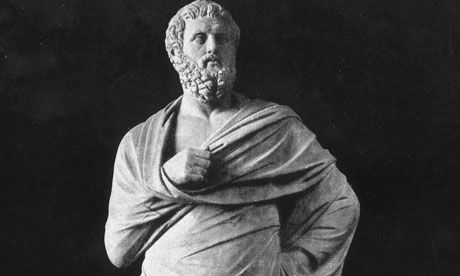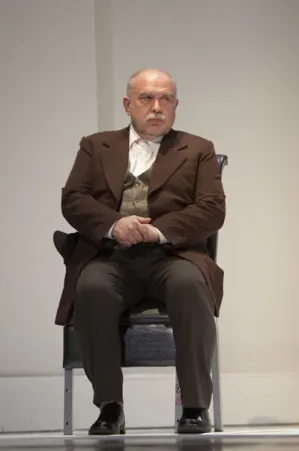Oedipus Rex
tragedy by Sophocles

OEDIPUS, POLITICS, POWER, CORRUPTION
… Creon’ s arrival from the out-of-city parodos is a matter of some dramatic importance. It is a first of three entrances that he will make in the play, at the end of which, as the new king, he will hold the position that Oedipus currently occupies. The priest informs Oedipus that it would seem that Creon brings good news or else he would not be wearing a crown fully ladden with laurel leaves. A laurel crown was worn by victors at the Pythian games, which were held at Delphi and were second in prestige only to the Olympic games. Creon’ s mask therefore endows him with an aura of the victor.
… The political motif is intensified with second entrance of Creon. He has heard the terrible accusations that the monarch (tyrannos), Oedipus, has levelled against him.Earlier, we note the distinctive quality of Creons mask with its laurel crown. It is a matter of some importance whether Creon’s mask is different in any way on his second appearance. It would be unusual if his costume where changed at all without some clue in the text. In fact, the text does draw special attention to Creons mask. As soon as Oedipus sets eyes on Creon, he immediately makes a pointed reference to Creons mask: „Have you such a face (prosopon) of effrontery that you have come to my house, when you are palpably my murderer and openly the robber of my kingship (tyrannis)?“ It is a reminder for the audience of the tacit threat that Creon poses to Oedipus.
… Seen from Oedipus’ point of view, he has only Creons word about the message from Delphi. A common charge against prophets in tragedy is that they are venal, and Oedipus has made it clear that he believes that Teiresias has been bribed by Creon. In the following angry scene between Oedipus and Creon, Creons arguments in his own defense have the specious air of political sophist:
CREON: ... I deem it fair to learn from you just as you deem is fair to learn from me.
OEDIPUS: Learn all you like: I shall not be exposed as a murderer.
CREON: Well then, are you married to my sister?
OEDIPUS: There can be no denial for the fact.
CREON: Do you rule this land, giving her an equal part?
OEDIPUS: All that she desires she gains from me.
CREON: And am I equal to you both as third partner?
OEDIPUS: It is in this very thing you prove a villainous friend.
CREON: Not if you reason the matter as I do. Think first of this, whether you believe that someone would prefer to rule in dread rather than to rule sleeping fearlessly, if the privileges be the same. Look, it is no in my own nature to desire to be a ruler (tyrannus) rather than enjoy royal perquisites (tyranna).“
Creon does not deny that he likes benefit of power; he simply does not want the aggravations of monarchy..It is not surprising that to Oedipus, Creon’ s speech seems duplicitous and does not allay his suspicions.
... Sophocles uses blind mask in three of the seven extant tragedies, as well as in at least two other lost plays. Did Sophocles train a special actor to use blind mask? If he did, it is conceivable that in the last part of the play, the actor who had played Teiresias earlier plays Oedipus in the last scene, and that Creon, the new king, is played by the actor who before had played Oedipus...Gould makes particularly telling point about Creon’ s final entrance: „Kreon’s entry ironically echoes his first entry in the play: once more there is a political decision tobe made, and once more the god’s judgement (i.e. Apollo at Delphi) to be sought, but now the decision is Kreon’s and like Oedipus’ then, he will await the god’s word and then act on it. This Kreon indeed possesses the same calm and reasonable assurance that was the mark of Oedipus in the opening scene, and like that Oedipus he has foreseen what must be done and has already sent for Oedipus’ daughters for a last greeting and farewell. It is as if Oedipus, himself transformed into another Teiresias, is reborn in this new cool but humane Oedipus.“
Josh Beer: Sophocles and the Tragedy of Athenian Democracy ( Praeger-Greenwood, Westport 2004 )
… It is the overthrow of the tyrannos, of man who seized power and thought himself „equated to the gods“. The bold metaphor of the priest introduces another of the images which parallel in their development the reversal of the hero, and which suggest that Oedipus is a figure symbolic of human intelligence and achievement in general. He is not only helmsman, ploughman, inventor, legislator, liberator, revealer, doctor – he is also equator, mathematician, calculator..One of Oedipus’ favorite words is „measure“ and this is of course a significant metaphor: measure, mensuration, number, calculation – these are among the most important inventions which have brought man to power. Aeschylus’ Prometeus, the mythical civilizer of human life, counts number among the foremost of his gifts to man.
Bernard Knox: Sophocles’ Oedipus (u: Tragic Themes in Western Literature, ed. by Clint Brooks, Yale UP, 1955)
Prepared by Svetislav Jovanov
 SOPHOCLES
SOPHOCLES
Sophocles (ancient Greek: Σοφοκλής circa. 495 BC - 406 BC) was the second of three great ancient Greek tragedians. He was preceded by Aeschylus, and was followed by or contemporary to Euripides. According to the Suda, a tenth century AD encyclopedia, he wrote 123 or more plays during the course of his life. For almost 50 years, he was the dominant competitor in the dramatic competitions of ancient Athens that took place during the religious festivals of the Lenaea and the Dionysia. His first victory was in 468 BC, although scholars are no longer certain that this was the first time that he competed. Only seven of his tragedies have survived into modern times with their text completely known. The most famous of these are the three tragedies concerning Oedipus and Antigone: these are often known as the Theban plays or The Oedipus Cycle, although they were not originally written or performed as a single trilogy. Sophocles influenced the development of the drama, most importantly by adding a third character and thereby reducing the importance of the chorus in the presentation of the plot. He also developed his characters to a greater extent than earlier playwrights such as Aeschylus. Sophocles was born in the rural deme (small community) of Colonus Hippius in Attica, which would later become a setting for his plays. His birth took place a few years before the Battle of Marathon in 490 BC: the exact year is unclear, although 497/6 is perhaps most likely. The young Sophocles won awards in wrestling and music, was graceful and handsome, and led the chorus of boys (paean) at the Athenian celebration of the victory against the Persians at the Battle of Salamis in 480 BC. His artistic career began in earnest in 468 BC when he took first prize in the Dionysia theatre competition over the reigning master of Athenian drama, Aeschylus. Sophocles became a man of importance in the public halls of Athens as well as in the theatres. Early in his career, the politician Cimon might have been one of his patrons, although if he was there was no ill will borne by Pericles, Cimon's rival, when Cimon was ostracized in 461 BC. In 443/2 he served as one of the Hellenotamiai, or treasurers of Athena, helping to manage the finances of the city during the political ascendancy of Pericles. He was also elected by the Athenian people as one of the ten generals for 441/0, during which he participated in the crushing of the revolt of Samos, though his contemporaries did not consider him a great politician or general. In 420 he welcomed and set up an altar for the icon of Asclepius at his house, when the deity was introduced in Athens. For this he was given the posthumous epithet Dexion (receiver) by the Athenians. He was also elected, in 413 BC at the age of 83, to be one of the commissioners crafting a response to the catastrophic destruction of the Athenian expeditionary force in Sicily during the Peloponnesian War. Several ancient writers have commented on Sophocles' love of youths. Athenaeus alleged that in addition to seeking and keeping female courtesans, "Sophocles was fond of young lads, as Euripides was fond of women." He quotes from a now-lost book by Ion of Chios regarding an incident of Sophocles flattering a serving boy at a symposium and then using a strategem to kiss and embrace him, as well as another, ascribed to Hieronymus of Rhodes, in which Sophocles is tricked by a hustler. Plutarch, in his "Life of Pericles," mentions an incident, during a naval expedition, in which Sophocles praised the beauty of a young recruit. Pericles rebuked him by warning that a general must keep not only his hands clean, but also his eyes. Sophocles died at the venerable age of ninety in 406 or 405 BC, having seen within his lifetime both the Greek triumph in the Persian Wars and the terrible bloodletting of the Peloponnesian War. He was so respected by the Athenians that two plays performed at the Lenea soon after his death paid homage to him, and his unfinished play Oedipus at Colonus was completed and performed years later. Both Iophon, one of his sons, and a grandson, also called Sophocles, followed in his footsteps to become playwrights themselves. In Sophocles' time, the Greek art of the drama was undergoing rapid and profound change. It had begun with little more than a chorus, but earlier playwrights had added first one and then two actors and thereby shifted the action of the plays away from the chorus. Among Sophocles' earliest innovations was the addition of a third actor, further reducing the role of the chorus and creating greater opportunity for character development and conflict between characters. In fact, Aeschylus, who dominated Athenian playwrighting during Sophocles' early career, adopted this third character into his own playwriting towards the end of his life. It was not until after the death of the old master Aeschylus in 456 BC that Sophocles became the preeminent playwright in Athens. Thereafter, Sophocles emerged victorious in dramatic competitions at 18 Dionysia and 6 Lenaia festivals. In addition to innovations in the structure of drama, Sophocles' work is known for deeper development of characters than earlier playwrights, whose characters are more two-dimensional and are therefore harder for an audience to relate to. His reputation was such that foreign rulers invited him to attend their courts, although unlike Aeschylus who died in Sicily, Sophocles never accepted any of these invitations. Aristotle used Sophocles's Oedipus the King as an example of perfect tragedy, which suggests the high esteem in which his work was held by later Greeks. Only two of the seven surviving plays have securely dated first or second performances: Philoctetes (409 BC) and Oedipus at Colonus (401 BC, put on after Sophocles' death by his grandson, also called Sophocles). Of the others, Electra shows stylistic similarities to these two plays, and so was probably written in the latter part of his career. Ajax, Antigone and The Trachiniae are generally thought to be among his early works, again based on stylistic elements, with Oedipus the King coming in Sophocles' middle period. Most of Sophocles' plays show an undercurrent of early fatalism and the beginnings of Socratic logic as a mainstay for the long tradition of Greek tragedy.
taken from: http://www.wikipedia.org/
 VIDA OGNJENOVIĆ
VIDA OGNJENOVIĆ
Vida Ognjenović was born in Dubočke near Nikšić, grew up and went to school in Vojvodina and Serbia. She finished elementary school in Vršac and grammar school in Sremski Karlovci. She graduated literature from the Faculty of Philology in Belgrade (1963), and directing from the Faculty of Dramatic Arts in Belgrade (1965). She began her post graduate studies at Sorbonne in Paris, and received her Master’s degree at the University of Minnesota, USA (1972). She worked as an assistant at the Faculty of Dramatic Arts in Belgrade from 1974 till 1979. In 1977 she was nominated Head of the Drama of the National Theatre in Belgrade and after that stayed as a director in that same theatre. As a visiting professor she taught at Universities in Los Angeles (UCLA, 1981-1982), Chicago (UIC, 1997-1998). On her lecturing tours, she visited all the major Universities in the USA (1985, 1991, 1997, 1999). She is a full professor at the Academy of Art in Novi Sad. She directed a great number of theatre performances, TV and radio dramas, many of which were her original plays. She wrote many dramas, which were staged and performed many times, and were also published by different publishing houses. As a director she was a guest in many theatres throughout former Yugoslavia (Montenegro, Slovenia, Croatia), and also did performances outside our country. She directed varied repertoire of plays, including Yugoslav and foreign classics as well as modern contemporary dramas.For her work she received all the significant theatre awards: Sterija Award for directing (“Jegor’s Road”, 2001), Sterija Award for the best text (“Was there Prince’s dinner?”, 1991), Sterija Award for dramatization (“Root, trunk and epilogue”, 1984), Sterija Award for the best text (“Jegor’s Road”, 2001), October Award of Belgrade for directing (“Mephisto”, 1984, Golden Wreath of the Festival in Sarajevo for directing “Mephisto”, 1985), “Joakim Vujić” Award for the text (“How to make Master laugh”, 1998), Golden Turkey for directing (“How to make Master laugh”, 1986), Golden Turkey for the best text (“How to make Master laugh”, 1986), Award of the Cultural Association of Belgrade for directing (“Migrations”, 1986),”Joakim Vujić” Award for theatrical play (1999), Vuk’s Foundation Award for art (“Was there Prince’s dinner?”, 1990, Award from the Budva City Theatre for dramatic work (2007)). She published six books: “Poisoned Dandelion Milk”, (Prosveta, Beograd, 1994) and “An old clock” (Prosveta, Beograd, 1996), “Best stories of Vida Ognjenović” (Prosveta, Beograd, 2001), novel “A House of Dead Scents” (Prosveta, Beograd, 1996), “Journey into travel book” (2005), novel “Adulterers” (2006) and seven books of dramas: “Melancholic dramas” (SKZ, Belgrade, 1991), “A girl with dark blue hair” (Ars Dramatica, Belgrade, 1994), “Mournful comedies” (SKZ, Belgrade, 1994), “Mileva Einstein”, collected dramas in three books Drama I, II, III (Stubovi kulture, 2000, 2001, 2002), “Kanjoš Macedonović” (Oktoih, Podgorica, 1989) and “Jegor’s Road” (Oktoih, Podgorica, 2000). She also received many significant literary awards: Prosveta Award for the book of the year (1994), Andrić Award for a story (1995), Branko Ćopić Award for prose text (1996), Laza Kostić Award for a novel (1996), Karolj Sirmai Award for stories (1996), Paja Marković Adamov Award for prose (1997), Ramonda Serbica Award for prose (1998), Stefan Mitrov Ljubiša Award for Literature (1999), Award from the National Library of Serbia for the book of the year (“Adulterers”, 2007). Her prose and dramas were translated into English, French, Hungarian, German, Norwegian, Macedonian and other European languages. She also worked as the Yugoslav (later Serbia and Montenegro) ambassador to Norway.
OEDIPUS REX AT THE NATIONAL THEATRE STAGE
This famous Sophocles’s tragedy was produced for the first time at The National Theatre on January 22, 1900, under the title Oedipus the King. Various sources mention two actors as a possible director of this faraway stage production – one is Miloš Cvetić, the other is Milorad Gavrilović. The piece was staged for the second time on February 22, 1957, under the title Oedipus Rex, in the translation of Dr Miloš Đurić. Director of this production was Dr Hugo Klajn, set designer – Miomir Denić, costume designer – Vera Borošić. Ljubiša Jovanović played the title role, Sava Severova, as a guest played Queen Jocasta, Vasilije Pantelić was Creon, Raša Plaović was prophet Teiresias. The following production was presented on December 7, 1979 in the translation of Ljiljana Crepajac. Horea Popescu, a guest from Romania, was director and set designer. Ljiljana Orlić was costume designer. The roles were assigned to: Miloš Žutić (Oedipus), Ksenija Jovanović (Jocasta), Petar Banićević (Creon), Vasa Pantelić (Teiresias).
Premiere performance
Premiere, October 20, 2007 / Main Stage
Direction and Adaptation Vida Ognјenović
Translation Gaga Rosić
Dramaturge Molina Udovički Fotez
Professional Consultant Božo Koprivica
Stage Speech Lјilјana Mrkić Popović
Set Designer Geroslav Zarić
Costume Designer Bojana Nikitović
Composer Zoran Erić
Producer Borislav Balać
Premiere cast:
Oedipus, the king of Thebes Igor Đorđević
Teiresias, a blind prophet of Thebes Predrag Ejdus
Prime Minister Boris Pingović
Creon, Jocasta’s brother Nenad Stojmenović
Minister Councilor Nebojša Kundačina
A Cabinet Chief Miloš Đorđević
Jocasta, Oedipus’s wife Aleksandra Nikolić
Messenger from Corinth Darko Tomović
Laius’s Shepherd Branko Jerinić
TV Journalist/Editor Jelena Helc
Cabinet Secretary Milena Jakšić
Cabinet Secretary Uroš Urošević
Journalist 1 Ana Stojanović
Journalist 2 Jelena Škondrić
Cameraman 1 Stefan Buzurović
Cameraman 2 Ivan Ivanov
Photoreporters Saša Tanasković, Gordana Perovski, Nebojša Đekić, Milojko Žižović
Organizers Nemanja Ralić, Nemanja Konstantinović
Stage Manager Saša Tanasković
Prompter Gordana Perovski
Assistant Set Designer Vladislava Munić
Lighting Designer Miodrag Milivojević
Video realization Petar Antonović
Make-up Designer Dragoljub Jeremić
Stage Master Dimitrije Radinović
Sound Designer Tihomir Savić
Video material was made at the National Theatre studio, under the supervision of Petar Antonović.
Costumes and set were manufactured in the workshops of The National Theatre in Belgrade






























